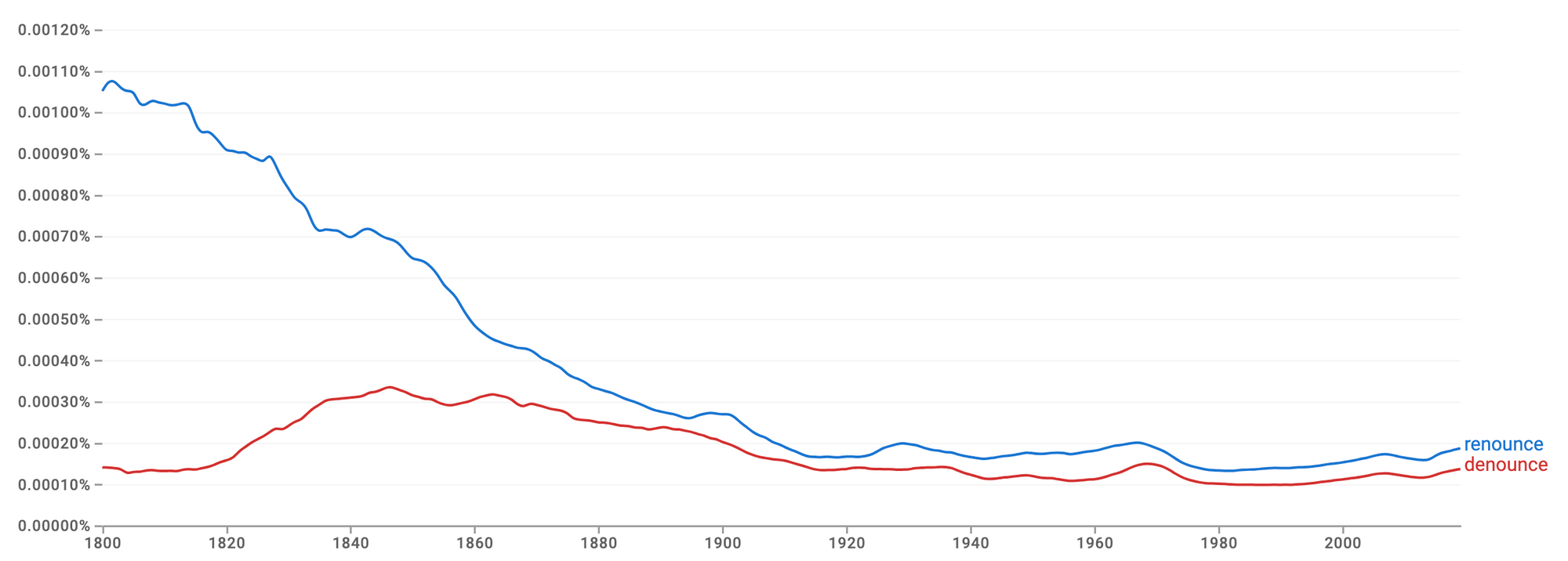- "Renounce" means to formally give up or reject a belief, claim, action, or association, often in a public or official manner.
- "Denounce" means to publicly condemn or criticize something strongly, expressing disapproval or censure.
😠 The activist took to the podium to denounce the unjust practices of the government.
When to use renounce or denounce
The words "renounce" and "denounce" have different meanings and uses, so choosing the right one depends on the context. Here's a breakdown:
When to Use "Renounce"
- Use "renounce" when referring to the act of formally abandoning or rejecting something, such as a belief, claim, citizenship, or allegiance.
- "Renouncing" often involves making a public or official statement about the decision.
When to Use "Denounce"
- Use "denounce" when expressing strong disapproval or condemnation of someone's actions, policies, behavior, or practices.
- "Denouncing" involves publicly and emphatically criticizing something with the intent to expose its flaws or wrongdoings.
Here's a helpful trick to remember
- Think of "renounce" as cutting off a "relationship" to a larger group, belief, or allegiance. Both words begin with "re-".
- Think of "denounce" as making your "dislike" for something public. Both words begin with "d-".
"Renounce" is used when formally giving up or rejecting personal affiliations or beliefs, often in an official manner. On the other hand, "denounce" is employed when publicly condemning or strongly criticizing actions, policies, or behaviors to express disapproval.
Example sentences
Renounce
- The athlete chose to renounce his sponsorship deal with the controversial brand.
- In a surprising move, the monarch decided to renounce the throne and live a private life.
- Religious leaders urged followers to renounce violence and embrace peace.
- The dissident writer had to renounce his citizenship to seek asylum in a safer country.
- Faced with ethical dilemmas, the scientist decided to renounce his involvement in the controversial experiment.
Denounce
- The opposition party held a press conference to denounce the government's economic policies.
- Activists gathered to denounce the environmental degradation caused by industrial activities.
- The community leader took a stand to denounce the rising crime rates in the neighborhood.
- The president used the international platform to denounce acts of terrorism.
- The organization issued a statement to denounce any form of discrimination within its ranks.
Examples from the web
Renounce
"Renounces Russian Citizenship Over Ukraine" - The New York Times
"Americans who renounced citizenship sue the US" - The Guardian
Denounce
"Denounces indictment as ‘political persecution" - The New York Times
"TikTok users denounce ban" - The Guardian

Usage of bye or by
The Ngram graph below shows how often "renounce" and "denounce" have been used from the 1800s to the 2000s. Both words have seen use throughout time, but while "renounce" used to see much more use than "denounce", they have seen similar levels of steady use since the 1920s to the 2000s.

FAQ
What does it mean to "renounce citizenship"?:
- Meaning: To formally give up one's legal status as a citizen of a particular country.
- Example: Seeking asylum, the activist had to renounce citizenship in their home country.
What does it mean to "renounce a claim"?:
- Meaning: To formally give up or disavow one's right or assertion to something, often in a legal context.
- Example: In the settlement, he agreed to renounce any future claims to the family estate.
What does it mean to "denounce a policy"?:
- Meaning: To publicly criticize or condemn a specific course of action or set of principles adopted by an individual, group, or government.
- Example: The opposition party held a press conference to denounce the government's economic policy.
Summary
So, there you have it! With this knowledge, you'll never confuse "renounce" and "denounce" again. Remember to use "renounce" for withdrawing your support or affiliation from a group or belief, and "denounce" for publicly critizing something. Go forth and use them confidently in your writing and speech!

Want to sound like a native speaker?
Engram’s AI-powered grammar checker makes your English sound like a native speaker’s, suggesting natural English expressions on top of fixing grammar, spelling, punctuation, word order, and vocabulary.

References:















